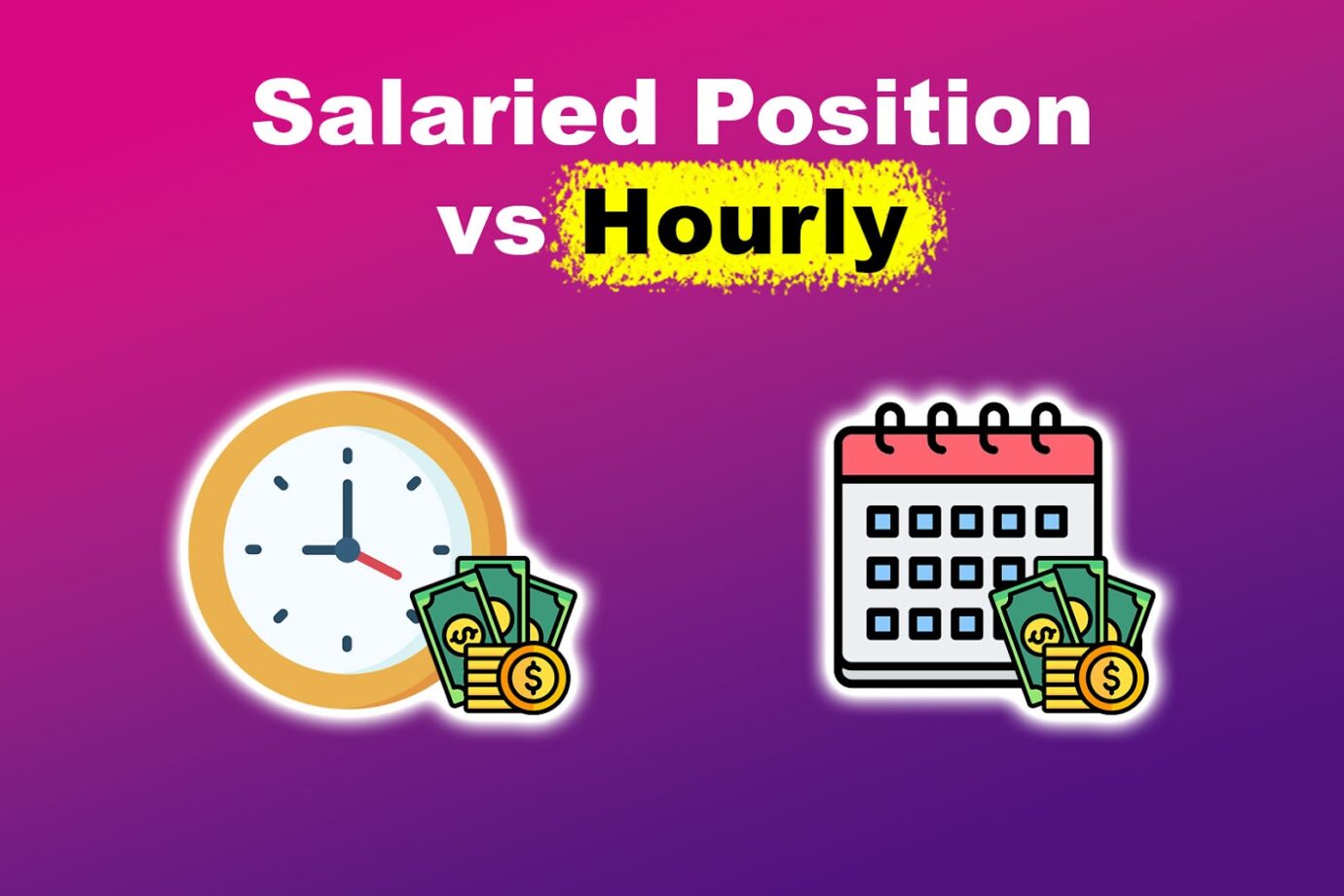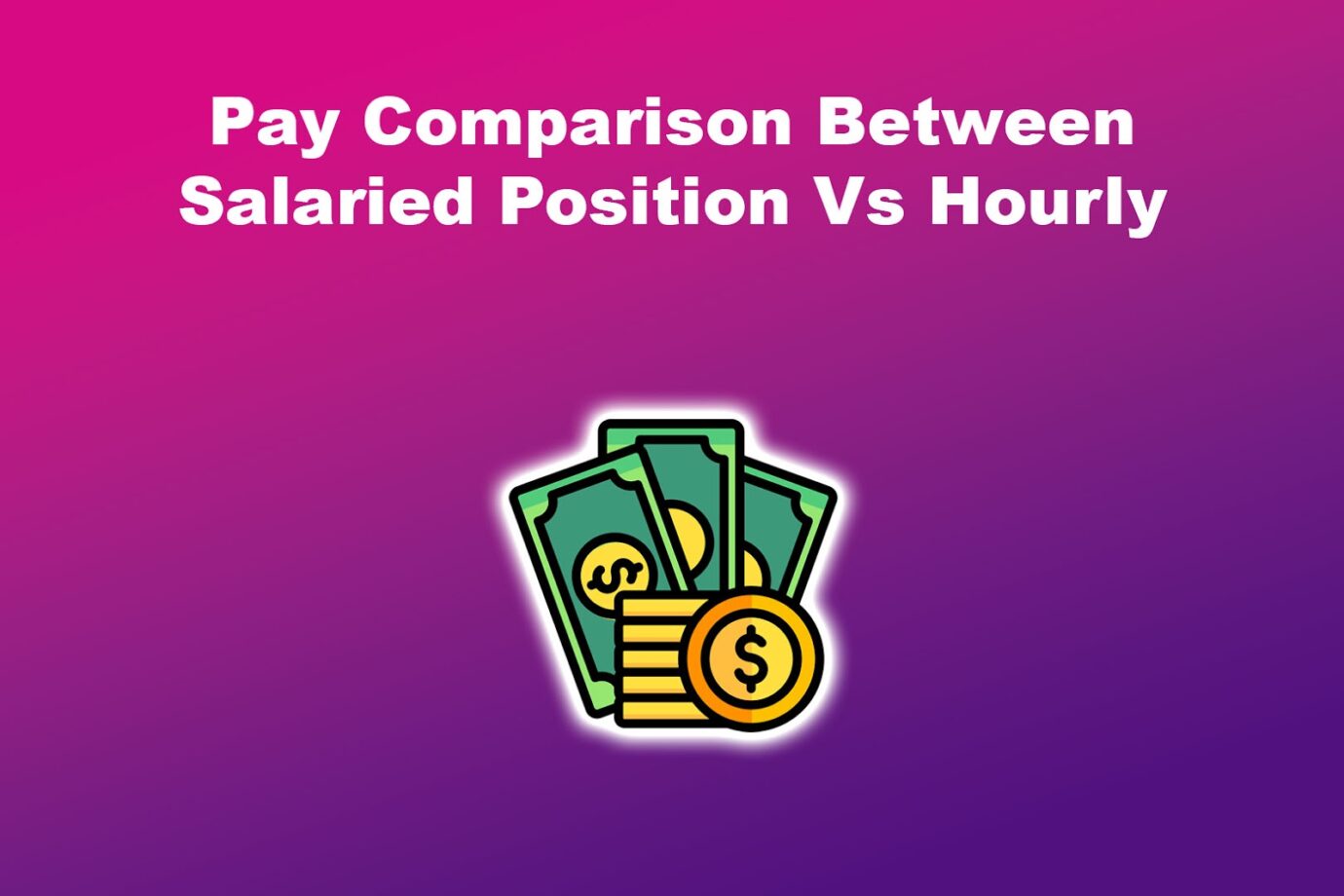The choice between a salaried position and an hourly role is more than just a matter of the paychecks. It’s about financial security, benefits, career balance, and growth. So which is better? Is salary better than hourly?
To help you make an informed decision, let’s explore the differences between a salaried position and hourly roles, including their pros and cons.

What’s a Salary?
A salary is a fixed, regular employee payment based on a specified employment contract. This means the employee earns the same amount until the terms are renegotiated. Often, a salary is paid at the agreed intervals in your employment contract, such as biweekly or bimonthly.
Find out more about a salary from Forbes.
What’s an Hourly Wage?
An hourly wage is the money an employee earns for every hour worked. This rate can vary depending on educational qualifications, professional experience, and expertise. An hourly wage has a minimum pay that differs from state to state and country to country.
3 Salaried Position vs Hourly Comparison
Here are the three comparisons between a salaried position and an hourly role:
1. Pay

Salaried Position
Salaried positions offer a fixed amount of money predetermined annually and dispersed at agreed intervals, regardless of the number of hours worked.
The employer evaluates the standards related to the type of job, location, skills, and kind of work and determines the salary range.
Hourly Position
The pay for an hourly position is calculated based on the number of hours worked. However, the total pay fluctuates depending on overtime, the applicable laws and taxes, the job, and other stipends the company might provide.
2. Hours of Work
Salaried Position
Employees in salaried positions must fulfill their duties, regardless of the hours worked. Thus, they may work extra hours without additional pay.
Hourly Position
Employers determine the number of hours hourly employees work per day or week. If they work more hours, they will be eligible for overtime.
3. Time Tracking
Salaried Position
Time tracking for salaried employees involves monitoring their duties. It typically involves noting a task or project’s start and end time and may also require clocking in and out at the beginning and end of the workday.
Hourly Position
Hourly employees are required to track the time they have worked accurately. They must clock in and out at the start and end of their shifts to comply with strict tracking requirements. Most employers use timekeeping systems to ensure accuracy.
If you work hourly and want to track your hours worked accurately, check out this list of time-tracking software for virtual assistants!
Is It Better To Be Paid Hourly or Salary?
Whether it’s better to be paid hourly or salary depends on personal preferences. If you want control over your work hours, an hourly role is a go-to as it offers more flexibility. Meanwhile, an hourly role is suitable if you want a higher earning potential.
However, a salaried job is better if you want a predictable income, job security, or benefits like health insurance.

Strengths of a Salaried Position vs Hourly
Here is a table summary of the strengths of a salaried position vs hourly:
| Strengths of a salaried position | Strengths of hourly position |
| Employees get a consistent paycheck, regardless of the hours worked, ensuring income stability. | Allows employees to take on multiple jobs, increasing their earning potential and skills. |
| Employees enjoy paid time off, such as sick leave and holidays, without the risk of losing salary. | Extra time worked is compensated at a high rate, providing additional income. |
| Eligible for other benefits beyond the salary, including health and life insurance, retirement plans, and perks like gym membership. | With defined working hours, employees can clearly define their time and working hours, leading to better work-life balance. |
| Allows employees to grow their careers with accessible roles while gaining experience and skills. | Employees can work flexible schedules, adjusting their hours or days to fit personal preferences. |
| Employees enjoy greater job security and are often part of the long-term company goals. This is because their positions are crucial to the organization’s operations. | It may come with fewer responsibilities, reducing the work-related stress. |
As you can see, the strengths of salaried and hourly positions greatly vary. The benefits of an hourly position are more inclined to flexibility, while a salaried position’s strengths are more stability.
Weaknesses of a Salaried Position vs Hourly
This is a table summary of the weaknesses of a salaried position vs hourly:
| Weaknesses of a salaried position | Weaknesses of hourly position |
| Employees only receive fixed income regardless of the number of hours worked. | Income fluctuates depending on the availability of work, making it difficult to maintain financial stability or budget plans. |
| It is difficult to create a work-life balance as employees are expected to work late, often resulting in bringing work home. | An hourly position lacks certain benefits, such as health insurance and retirement plans. This can cause financial strain during emergencies or even when saving for the future. |
Employees have less control over their work as they are subject to organizational hierarchies. This can limit their ability to make decisions independently and grow their skills. | Hourly employees lack consistent working hours, making managing their personal lives or planning schedules challenging. |
Read more about the weaknesses of hourly employees from LinkedIn.